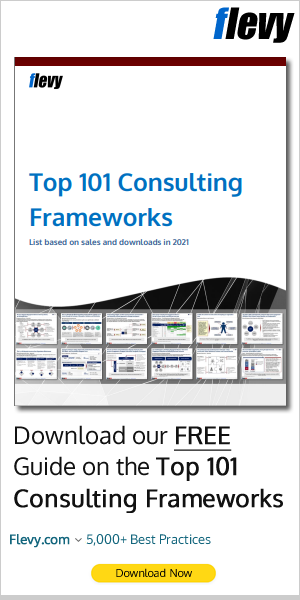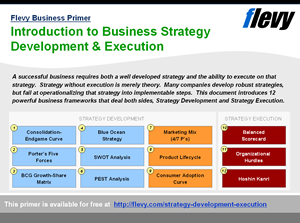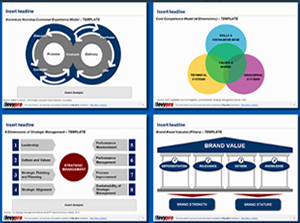Editor's Note: Take a look at our featured best practice, Digital Transformation Strategy (145-slide PowerPoint presentation). Digital Transformation is being embraced by organizations across most industries, as the role of technology shifts from being a business enabler to a business driver. This has only been accelerated by the COVID-19 global pandemic. Thus, to remain competitive and outcompete in today's fast paced, [read more]
The Significance of a Data-Driven Culture in Digital Transformation
Also, if you are interested in becoming an expert on Digital Transformation, take a look at Flevy's Digital Transformation Frameworks offering here. This is a curated collection of best practice frameworks based on the thought leadership of leading consulting firms, academics, and recognized subject matter experts. By learning and applying these concepts, you can you stay ahead of the curve. Full details here.
* * * *

If that’s how you perceive data, you have much to lose as an entrepreneur, marketer, and 21st century professional. We live and work in an age driven by data. No industry remains immune to the potential of data-driven insights. Data dictates everything, from customer experiences and product sales to supply chain management and resource consumption.
Data-driven cultures hold immense significance in a world characterized by rapid digital transformations. Corporate systems evolve dramatically, and data holds the key to productivity, profitability, and progress. Keep reading to explore the significance of data-driven cultures in the digital transformation of your business.
Harnessing the Power of Data
Data carries valuable insights and projections that allow entrepreneurs to make profitable and practical decisions. Data-driven corporate cultures harness the power of data by organizing, reviewing, and analyzing data insights. Each business activity generates vast volumes of data, carrying actionable insights about the company’s productivity levels and progress.
Harnessing the power of data eliminates the specter of surprise by allowing entrepreneurs to identify their strengths and weaknesses. Before the advent of data analysis, nearly all existing predictive models delivered misleading and non-factual information. Data offers concrete, accurate and factual insights by examining business performance against multiple metrics.
However, adopting data-driven cultures demands a specific skill set. Therefore, entrepreneurs are strongly advised to undertake a short course to familiarize themselves with data analysis and tech-savvy innovations. A large company can acquire talented and experienced data analysts and scientists, but small businesses do not have such resources.
Most small business owners rely on their academic training and core capabilities to advance their corporate growth with masterful strategies. Continual learning is an excellent decision to keep up with the pace of emerging technologies and eliminate the fear of falling behind. Luckily, the e-learning environment offers many courses to help entrepreneurs embrace digital literacy.
Enhancing the Consumer Experience
Businesses rely on consumer satisfaction to foster brand loyalty and ensure corporate survival. Customers can make or break a brand, and their interactions with a business depend entirely on the customer experience. How much does your company invest in analyzing and improving its customer experience and outcomes?
Companies invest a significant chunk of their resources in satisfying consumers before, during, and after the sales are executed. A customer can exhibit dissatisfaction at any point, resulting in a loss of customers or negative publicity. Luckily, the data-driven culture offers a straightforward and streamlined route to ensuring customer satisfaction.
All interactions between businesses and consumers generate data, which holds valuable insights about consumer behaviors. For instance, data-driven insights reveal best-selling products, consumers’ color preferences, and most popular buying channels. These are just a few examples of the insights data carries into how consumers shop with your brand. The study of data analysis is much more multifaceted and vast, covering every aspect of consumer behavior and engagement.
Using data-driven insights allows marketers to target consumers with advertisements, products, and offerings they genuinely desire. In simpler words, data holds the key to securing consumer satisfaction by personalizing the customer experience to suit their preferences.
Strengthening Decision-Making Processes
Corporate leadership comes at a heavy price, for every decision profoundly impacts a company’s survival. One wrong decision can result in millions worth of losses, forcing a small business into bankruptcy. In contrast, a pragmatic and timely decision can avert losses, propelling the company towards unimaginable profitability.
But how can leaders differentiate between right and wrong decisions? Previously, business owners trusted their gut feeling and prayed for positive outcomes. Modern-day entrepreneurs rely on data-driven insights and work closely with data analysts to make effective decisions. Data science relies on predictive models and analysis to pull actionable insights that guide decision-making processes.
Suppose a company wants to expand to a foreign location after witnessing a steady demand for its products. In that case, data analysts will prepare data visualizations and predictive models to assess profitability potential. Data insights will predict the exact volume of demand and consumer audience to help C-suite executives make strategic choices.
If the demand is steady with high profitability potential, the company can proceed with the foreign expansion. However, if the demand is minimal and doesn’t support high-profit volumes, the cost of expansion will deter executives. Interestingly, expansions and customer service aren’t the only decisions made in the light of data-driven insights.
The power of data extends to all business operations and decisions, from managing stockpiles and human resources to launching new products. Data-driven cultures support pragmatic and strategic decision-making to ensure positive and profitable outcomes.
Solving Complex Business Problems
Decades ago, when entrepreneurs didn’t have access to digital tools, they relied on their business acumen and core competencies. Terms like gut feeling and sixth sense were thrown around in corporate circles, associating great respect for entrepreneurs who possessed them. People assumed that problem-solving acumen was innate and inherent – either you had it or you didn’t.
The shift to digital transformation and data-driven cultures has effectively demonstrated that all knowledge is learned and learnable. Entrepreneurs do not have to rely on generational wisdom or inherent capabilities to perform well in the corporate arena. With the advent of big data and machine learning algorithms, problem-solving complexities are rapidly disappearing.
Data allows businesses to harness the power of digital computation to overcome complex problems. Corporate cultures rely on data-driven insights to eliminate obstacles impeding productivity and revenue growth. Suppose a company is struggling with competitive pricing and experiencing a sharp decline in revenues. In that case, data analysis can solve problems by identifying cost-reduction techniques that don’t undermine quality.
Interestingly, data-driven insights offer a wide range of potential solutions to overcome a problem efficiently.
Conclusion
The shift to data-driven cultures is no longer a luxury in today’s digitally charged and rapidly evolving world. Businesses and entrepreneurs who fail to harness the power of data will find themselves pitted against unsurpassable odds. How will you respond if your competitor is leveraging data-driven insights to capture market share?
Data analysis allows business owners to analyze their progress and learn from their competitors’ strategies. It considers a company’s internal and external environments to create insightful predictive models. Without data-driven cultures, companies cannot ensure their survival in highly volatile, digitally savvy industries.

Want to Achieve Excellence in Digital Transformation?
Gain the knowledge and develop the expertise to become an expert in Digital Transformation. Our frameworks are based on the thought leadership of leading consulting firms, academics, and recognized subject matter experts. Click here for full details.
Digital Transformation is being embraced by organizations of all sizes across most industries. In the Digital Age today, technology creates new opportunities and fundamentally transforms businesses in all aspects—operations, business models, strategies. It not only enables the business, but also drives its growth and can be a source of Competitive Advantage.
For many industries, COVID-19 has accelerated the timeline for Digital Transformation Programs by multiple years. Digital Transformation has become a necessity. Now, to survive in the Low Touch Economy—characterized by social distancing and a minimization of in-person activities—organizations must go digital. This includes offering digital solutions for both employees (e.g. Remote Work, Virtual Teams, Enterprise Cloud, etc.) and customers (e.g. E-commerce, Social Media, Mobile Apps, etc.).
Learn about our Digital Transformation Best Practice Frameworks here.
Readers of This Article Are Interested in These Resources

|
|
181-slide PowerPoint presentation
|
|
153-slide PowerPoint presentation
| |||
About Shane Avron
Shane Avron is a freelance writer, specializing in business, general management, enterprise software, and digital technologies. In addition to Flevy, Shane's articles have appeared in Huffington Post, Forbes Magazine, among other business journals.
Top 10 Recommended Documents on Digital Transformation
» View more resources Digital Transformation here.
» View the Top 100 Best Practices on Flevy.













